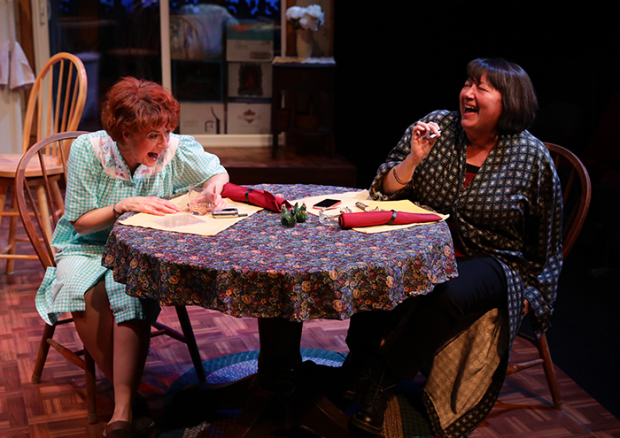An Odd Couple Find Their Footing in The Roommate
Two middle-aged women come together to reinvent their lives in this Lyric Stage production.

(© Mark S. Howard)
Jen Silverman's two-hander, The Roommate, is about an unlikely matchup of two women bunking in together at a time when they both need a change in the direction of their lives.
Sharon is a middle-aged, recent divorcée, living in a comfortable house in Iowa City, where she has wrapped herself in a cocoon of trips to the grocery store and meetings of her reading group, punctuated by too-frequent calls to her son in New York. Since he seldom picks up the phone, she is mostly talking to his voicemail. Somehow (we never find out how exactly), Sharon has found Robyn, her first-ever roommate, and invited her to share her home — sight unseen — for an extra bit of money and, more likely, because she's lonely.
Robyn is an escapee from the Bronx who has come to the Midwest to start a new life. Unlike Sharon, she is streetwise, sophisticated, and hiding some secrets, perhaps even from herself. She arrives with emotional and literal baggage in the form of hastily packed boxes and a large window box of leafy, green plants she describes as "herbs." The backstory to these women's lives gradually comes out as they warm up to each other over the weeks.
The 90-minute play is written in short, episodic scenes, broken by intrusive blackouts during which stagehands scurry out to change props that help indicate the passage of time. By the end, the two women reverse their perspectives, with Sharon buying into the wilder notions of Robyn's life, and Robyn becoming dismayed at the effect she has had on her formerly repressed host. Both learn some unexpected lessons by the end.
Director Spiro Veloudos wisely cast Paula Plum as the impressionable, needy Sharon, and Adrianne Krstansky as Robyn. Both actors enhance their roles and lift the play to a new level.
The small, red-haired Plum flutters around the stage with the antic grace of an animated character from a Disney film. She is constantly checking her behavior and apologizing in self-deprecating ways in order to accommodate this strange woman from what she imagines is the "dangerous" terrain of the Bronx. Krstansky is quiet and tough, watching and listening rather than disclosing too much information about herself. She seems more in control but somewhat less than trustworthy, given the contradictions she reveals about her past. She self-identifies as a slam poet, a vegan, and a lesbian, which puts Sharon in an unfamiliar state of delighted amazement. The plot takes off on Sharon's trajectory through a series of new experiences, fueled by Robyn's example.
The play unfolds across Jenna McFarland Lord's set of a spacious, well-worn kitchen, filled with all sorts of fussy doodads and household accessories, as if to visualize Sharon's homebound life as a construct from a Sears catalogue. The juxtaposition between the two women is further enhanced by costume designer Tobi Rinaldi, who dresses Robyn in sleek, black, urban wear and Sharon in a muumuu and Midwestern plaid shirts.
Veloudos moves the action along quickly, leaving no time for the audience to doubt Sharon's audacious transformation or the poignancy of the ending. However, the sentimental wish-fulfillment for the characters is less rewarding than Plum's and Krstansky's fine performances, which elevate the production to a must-see on Boston's theatrical fall calendar.








